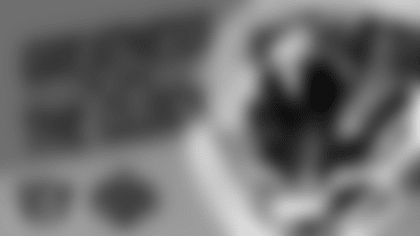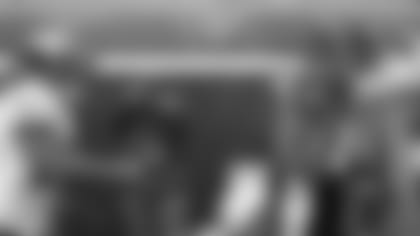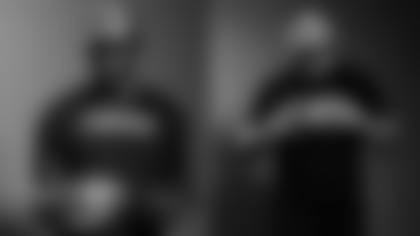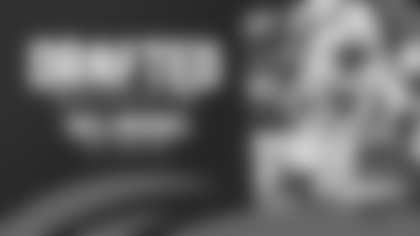Anyone who saw one of T.J. Houshmandzadeh's 627 NFL catches (626 more than Cedric James on that lengthy list of wide receivers drafted ahead of him he can still recite from memory and pure rage), isn't surprised that he's trash-talking with his 10-year-old son.
Krew Houshmandzadeh has been telling his dad he's going to be better than him.
"You were drafted in the seventh round. They thought you stunk," is how T.J. Houshmandzadeh relates the conversation. "My son is really good. I just say, 'I hope you are better than me, but you probably won't be.' He said, 'Well, I'm going to get drafted before you.'"
That won't take much. Krew's dad went in the last round of this 2001 NFL Draft Odyssey that was one of the best hauls in Bengals' history with four Pro Bowlers.
The 204th player, to be exact. Much lower than one of the Bengals' two third-round picks he'll announce to the world Friday night in Detroit in a role reserved for franchise staples. He's still not getting the early call. Houshmandzadeh, who now trains receivers coming out for the draft, figures to see two of his guys, Washington's Rome Odunze and LSU's Brian Thomas Jr., go the night before in the first round.
Houshmandzadeh's Oregon State running mate and fellow Los Angeles-area product, Chad Johnson, most famously went before him, too. To the Bengals at No. 36, he became their all-time leading receiver.
Their first pick, No. 4 overall, was Missouri defensive end Justin Smith, one of the Bengals' all-time leading sackers and five-time Pro Bowler with the 49ers. Their fourth-round pick was Auburn running back Rudi Johnson, who twice set the Bengals' single-season rushing record and still holds it.
And then at the end of the day, Houshmandzadeh, the fifth-leading receiver in Bengals history whose single-season club record of 112 catches in 2007 has been targeted by Ja’Marr Chase.
All fueled by a Titanic chip on the shoulder and a memory longer than The List of the 26 receivers that went before him. The List he used to keep taped to his locker. The List he didn't really need because the day he was named to the 2007 Pro Bowl he recited it from memory.
He can pretty much do it now. He doesn't stumble until the third round. About a dozen guys in.
"David Terrell to the Bears at 8. Koren Robinson to Seattle. Rod Gardner, Clemson, went to (Washington). Santana Moss went to the Jets. I remember that," Houshmandzadeh says. "The one that blew my mind, I'll never forget it, when the Eagles drafted Freddie Mithell with the 25th pick. I'll never forget it. Reggie Wayne was the last pick in the first round for the Colts."
Houshmandzadeh, who knew of Mitchell from his days at UCLA and felt it wasn't even close, had to wait to join Chad Johnson and form one of the NFL's most exciting duos of the decade.
He also remembered he was nearly 40 selections behind someone named Bobby Newcombe.
Bobby Newcombe? Never took an NFL snap, never mind catching a pass. But Krew Houshmandzadeh's dad knows exactly who he is.
"Newcombe from Nebraska. Are you really going to start taking guys who haven't played receiver over me? He was a quarterback," says Houshmandzadeh, remembering how he seethed at the broadcast when a guy who hadn't played receiver since his freshman year got the call.
"I was so, so angry. And then Cedrick Wilson from Tennessee (No. 169) went to the Niners. And I'm like, I don't even want to play football anymore. This is so bad. I don't even want to play anymore. Like, I was so angry. It wasn't just Cedrick Wilson. It was just all these dudes that were going ahead of me and I knew they weren't better than me. What are they doing?"
The NFL's decision-makers were doing the same thing they were doing when Houshmandzadeh steps to the lectern Friday night instead of watching. They're just trying to get it right, which seems to be an elusive task in any year no matter the technology or analytics.
Like they tried to get it right a generation ago when Houshmandzadeh almost slid all the way through. Like they tried last year when the Rams picked Puka Nacua, a BYU wide receiver born the year Houshmandzadeh went so late. After going with the 177th pick in the fifth round, Nacua shattered a slew of rookie league records on the way to the Pro Bowl and runner-up for NFL Offensive Rookie of the Year.
Just ask the guy who coached them both.
"Sometimes the NFL undervalues guys like that. Guys who are football players and not track guys," says Rams wide receivers coach Eric Yarber, who coached Houshmandzadeh at Oregon State. "T.J. was faster than Puka, but they have that same type of toughness. A lot of people de-valued Puka because of the 40 time he ran."
(They did the same thing to Rams' Super Bowl MVP Cooper Kupp when he ran a 4.6. Yarber and Rams head coach Sean McVay exulted because they knew they could get him in the third round: "We put too much on speed.")
Puka ran a glacial 4.57-second 40-yard dash, but Yarber says he and Houshmandzadeh were used in such a way in college that their ability to play fast was obscured.
"Ask Yarbs how well I ran at my pro day. I'm going to give you his number. Don't listen to me. Let him tell you. Faster than Chad," Houshmandzadeh says.
Yarber: "Yup. Sub 4.4. Faster than Chad. But people didn't look at how fast he played. He played all over the place for us, so you always couldn't see the speed. Played the X. Played the Z. Our slot receiver went down and T.J. played in there the first three games. Smart as a whip. I told Chad he owed him $1 million. He got him lined up."
That 2001 Draft was clearly an Odyssey.
It began with Bengals president Mike Brown musing if he were doing the draft alone, he would use the Bengals' first pick on a highly scrutinized Purdue quarterback who wasn't getting much love.
Drew Brees may or may not have been 6 feet. But much of his draft room, and, as it turned out, the rest of the league, didn't think he measured up in the first round. Brown thought Brees worthy of the fourth pick because of the position and the fact he was so smart and accurate, it negated his height.
"He really wanted Brees. There was concern about his height. Barly six-foot. He proved me and the offensive coaches wrong. The guy is a Hall-of-Famer," says Bob Bratkowski, who was then in his first season of ten as the Bengals record-breaking offensive coordinator.
Jim Lippincott, the Bengals' former long-time personnel man, knew that Brees wouldn't get past the Bengals a second time. The Bengals were two years removed from Akili Smith not panning out and a month from signing free-agent Jon Kitna, a playoff quarterback who knew Bratkowski's system and a guy they felt could settle the offense and pair it with a defense that would finish in the NFL top ten that season.
Lippincott had been there at the NFL scouting combine's weigh-in back in February and saw Brees measured.
"The heels have to be flat and the butt up against the wall. Drew kept coming up on his toes," Lippincott says. "The guy would tell him to put his toes down and he'd start to measure. Three or four times and the guy finally said, 'OK, he's not going to cooperate. So put the height you want, but he's not six foot.' That always stuck with me. Give Mike credit. The guy was a great player."
Perception over reality. Foreshadowing of the seventh round. As Brees slid through the first round, Brown paced, Lippincott recalled. When the Chargers took him with the first pick in the second round at No. 32, Chad Johnson came home four spots later.
In large part because Bratkowski, coming over from the Steelers, had coached Johnson at the Senior Bowl. Plus, ten years before he had been Oregon State head coach Dennis Erickson's offensive coordinator when the University of Miami won two national titles. So he was well schooled in anything Pre-Ochocinco.
But landing both Johnson and Houshmandzadeh was truly a team effort among coaches and scouts alike that included a "backyard workout," at Jackie Robinson Stadium, a snapshot from an era when the draft was a more sprawling enterprise for the Bengals and the NFL.
Duke Tobin, now the club's director of player personnel, worked the West Coast back then and during his August visit to Corvallis discovered Johnson, on his third school and fresh out of Santa Monica Junior College, wasn't yet on the league's standard lists of prospects. Tobin sat down with Johnson for his first Bengals interview and generated the first notes on him. He also identified Houshmandzadeh as potentially on the radar.
And it turned out, they not only had a connection at the school with Bratkowski, but also with wide receivers coach Steve Mooshagian. Mooshagian, a California native, had actually tried to recruit Houshmandzadeh when he was at the University of Pittsburgh.
In a twist that only works in the movies and the last rounds of the NFL Draft, Mooshagian also played at Houshmandzadeh's junior college, Cerritos, on the Los Angeles outskirts and played for the same coach.
"When it got late, I jumped on the table for T.J.," recalls Mooshagian, heading into his 15th season as Ventura College's winningest head coach, compiling 101 victories about an hour drive northwest of L.A. Angeles.
"I said, 'If we get to the seventh round and don't take him, we're fools.' I probably saw him a lot more than the other people that were scouting him. He was really good against tight coverage. He couldn't get jammed. I liked his football IQ. He had competitive energy like nobody I've seen. He would not back down from anyone. No fear. I just loved his mental toughness."
Lippincott and Tobin, guided by coaching convictions, had watched the tape and they identified Houshmandzadeh as an option late. At that point in the draft, with all the competing grades, passionate knowledge can tip it.

2024 NFL Draft
The Bengals source of news, interviews, photos and more at the 2024 NFL Draft.
"I told Brat and Mooshagian if they got T.J. in the fifth, sixth or seventh," Yarber says, "they should go to jail for stealing."
Lippincott: "Chad and T.J. were both great route runners. They could un-cover man-to-man."
Mooshagian had to be a great route runner himself just to chase down Johnson for a pro day: "He was a mercenary. He never went back to Oregon State after the season." Johnson and Houshmandzadeh showed up at USC's pro day because they lived in the radius, but Mooshagian says then USC head coach Pete Caroll wouldn't let them work.
That's how they ended up at Jackie Robinson Stadium about a mile away, is how Mooshagian remembers it. Mooshagian. Buccaneers wide receivers coach Charlie Williams. Chargers wide receivers coach Mike Sanford Sr. Charles Collins, the trainer for Johnson and Houshmandzadeh.
That's it.
"It was an old school draft workout. In the backyard," Mooshagian says. "We were doing receiver drills and 40 times and change of direction. The ball was not (thrown) on time, but we could see how they adjusted to the ball. I was kind of nervous because I had great times for them both. A lot better than Chad ran at the combine."
They held up. Mooshagian came back and gave Johnson a first-round grade and Houshmandzadeh a fourth. Among receivers, the Bengals had Houshmandzadeh ranked where they could have taken him as early as the fifth.
How did the Bengals get him? The guy who ended up with the fifth most NFL catches in that draft at No. 204? (The four ahead of him, Wayne, Steve Smith Sr., Chad Johnson, Moss went in the top 75.)
"He was mouthy and a jerk at the East-West game After he made every catch, he had something to say," Mooshagian says. "He had the ponytail. Tattoos on his arms. I think that scared a lot of people off. But when you got to know him, that was just the great competitor in him."
Yarber snapped at the NFL scout who came to Corvallis and declared, "T.J.'s a thug, isn't he?" Yarber exploded. "He's going to do what he does every day. He's going to come in here into my office and then go watch film for 30-40 minutes. Go watch film with him."
An hour later he saw the guy and asked, "Well, is he thug?"
"No, the scout said. "He's the most impressive receiver I've sat down with all year." Yarber then proceeded to upbraid the scout on pre-judging a person and passing on the wrong perception to the rest of the league.
"When they say perception is reality, the reality is they perceived me to be one way," Houshmandzadeh says.
But he did have Yarber in his corner and that's why he invited Yarber and his wife to his Pro Bowl in Hawaii.
"The scouts would come in looking to write up Chad and I'd tell them, 'If you write up Chad, you have to write up T.J.," Yarber says. "I've had scouts who are now GMs thanking me for making them write up T.J."
But no one made the call until the sixth round began to close and Mike Brown asked Bratkowski to get one final signoff from Erickson. Bratkowski ducked into one of the offices adjoining the draft room and phoned his old boss.
"We had talked to him about Chad, but not much about T.J.," Bratkowski says. "Dennis was very much in his corner. He just thought he was a steady player who was reliable and had a lot of confidence in himself. He reached a point he was on the radar. We had seen him on film and we had his strengths and weaknesses. It was confirmation mainly about personality and work habits and those are things to get from someone who has witnessed it. It was good and it turned out well for us. He was a great slot receiver. We were really rolling when we had him, Chad, and Chris Henry."
Houshmandzadeh is still fuming, but he's grateful he went to the Bengals. He says no other team would have stuck with him through his early injuries. He says Bratkowski's offense was perfect for him because it rewarded smart, resourceful receiver play.
Plus, he liked the owners.
"I talked to Mr. Brown from the day I showed up. I think I would talk to Mike almost every day," Houshmandzadeh says. "There would be other guys on the team like, 'I've been here six, seven years. I haven't talked to him as much as you've talked to him in one day.' I appreciate that. I really do because deep down I think we're all good people. I actually think I'm a good dude."
And, the Bengals saw the competitor through the anger.
There was a fight at an East-West practice the same reason there was a fight in his first Bengals rookie minicamp practice.
"The DB wouldn't quit holding me," Houshmandzadeh says. "They didn't hold me after that."
He has no regrets. He thinks he got a little complacent at the end of his career ("I should have played 13, 14 years" instead of 11) and he still thinks he should have gone at least in the third. That would have made him a richer player. Right about when he makes the Bengals' call Friday at No. 80.
"All those guys (Chad, Reggie Wayne, Steve Smith, Santana Moss) had opportunity from day one," Houshmandzadeh says. "I really didn't get it until my fourth year. That's the way it is when you're drafted late."
But, like Sinatra, too few regrets to mention.
"I'm a bit emotional. I know that. But I think that emotion is the reason that I was able to make it the way that I've made it when you consider I didn't start playing football until I was a senior in high school," Houshmandzadeh says. "I think that emotion and that determination and my competitiveness, it fuels a lot of that.
"That's how I would want my player to react if he got passed in the draft."
Houshmandzadeh tells his receivers the same thing his old Bengals head coach Marvin Lewis used to say.
"It doesn't matter how you got here," Houshmandzadeh says, "but what you do when you get here."
Krew Houshmandzadeh is taking notes.







